Computing & IS
DGRT & CoCIS Discuss Modalities to Enhance Graduate Enrolment & Output
Published
3 years agoon
By
Jane Anyango
A team from the Directorate of Graduate Research and Training (DGRT) led by the Director, Prof. Edward Bbaale on 4th May 2023 visited the College of Computing and Information Sciences (CoCIS) to collect views that will enable the Directorate to undertake comprehensive policy reviews relating to graduate research and training as the university moves towards being research-led.
The Directorate also wanted to pick lessons from CoCIS management on the best practices and points of success as well as the pressing policies that are a roadblock to graduate research and training at Makerere University.
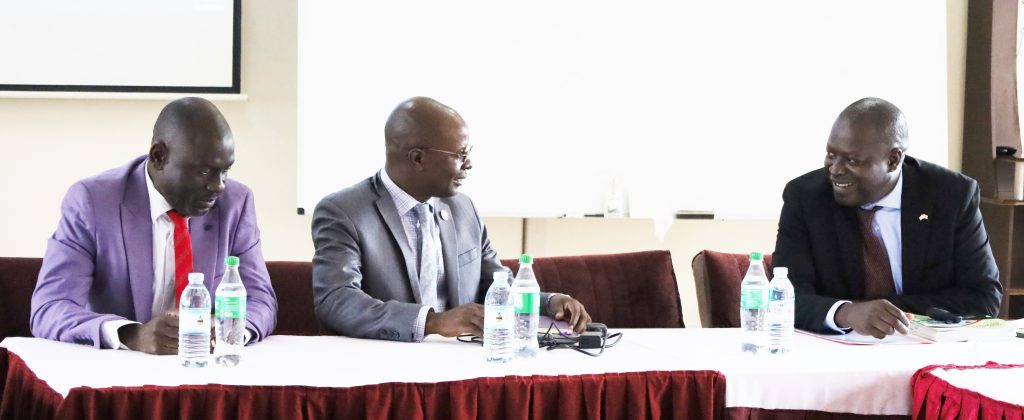
The DGRT and CoCIS meeting was attended by the Principal Prof. Tonny Oyana and his Ag. Deputy, Dr. Peter Nabende, Deans, Heads of Departments, graduate programme coordinators, and academic and administrative staff handling graduate programmes.
The discussion focused on strategies for increasing graduate enrolment and graduation output at the college, a sustainability plan for managing graduate education and research and ensuring that the process of programme accreditation is expedited by concerned stakeholders.
Other issues discussed were the need to have a structure for the PhD by research, funding for graduate studies as a major bottleneck for graduate completion, incentivizing graduate supervision and examination, teaching workload vis a vis research and other mandates. Also discussed was the need to streamline communication, management and monitoring of graduate training and research in the university and attract post-doctoral students to tap into their intellectual property and research output.
Calling upon staff to reorient their minds and energies towards the university’s strategic direction, the Director DGRT Prof. Edward Bbaale said the main aim is to entrench graduate training at Makerere University by gradually reducing undergraduate enrolment and increasing doctoral and postgraduate intake and programmes.
“The target is that by 2030 we should have 30% of our students being graduate students, but currently we are around 12%. So, we are still less than half of the target in our strategic plan, but also out of the 30%, we envisage having, 10% must be foreign students which should be internationalized as much as possible. Currently, our share of international students is only 2%.”, Prof. Bbaale said.
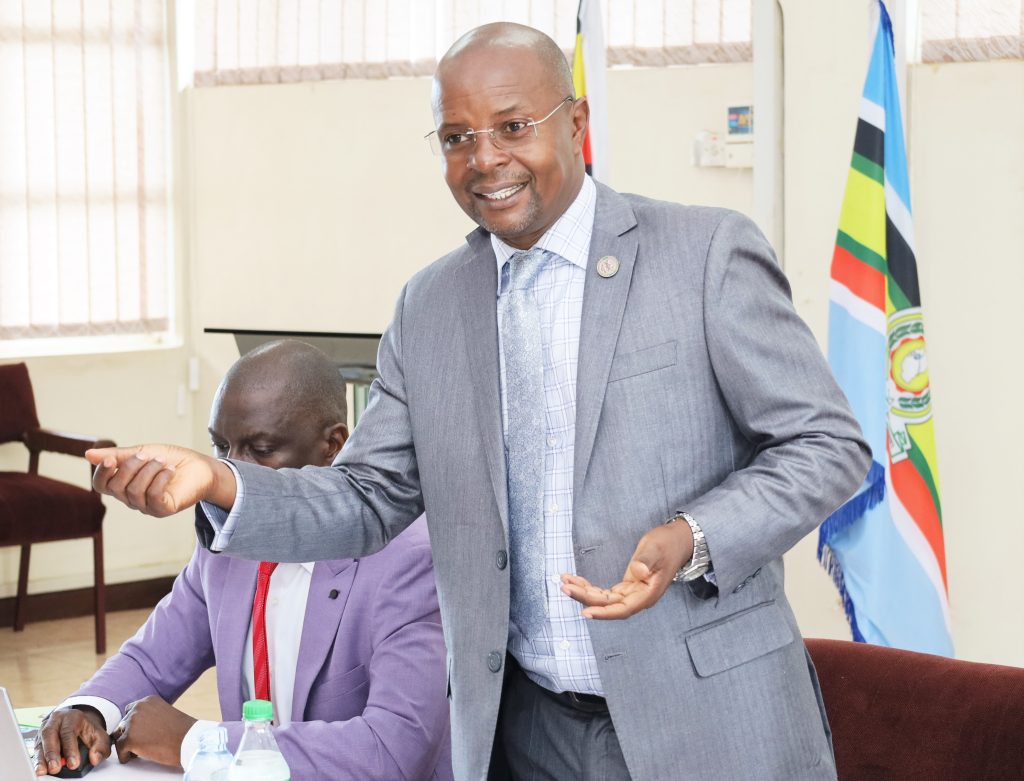
In addition to the prioritization of graduate training, the Director said, the university has identified other key building blocks of the research-led agenda including the packaging and marketing of research into marketable products for appropriate adoption and adaptation in order to impact the community.
Prof. Bbaale implored staff to form research groups and grow a multidisciplinary culture of research saying, there is a university policy before the Senate on the establishment of an institute and a centre of excellence which also defines a research group.
Bbaale highlighted that some of the key mandates of the DGRT entail initiating and reviewing policy to provide a conducive environment for graduate training and research, disseminating policies and ensuring that they are adhered to.
He reported that the Directorate had embarked on reviewing a number of policies to provide a conducive environment for graduate training and innovative research. These include the Graduate Handbook, the Postdoc policy, the university research agenda 2018 and the curriculum for the PhD by research.
“Counterparts in South Africa are challenging us with this aspect of post-doc policy. They enjoy a great harvest of quality research because of the post-doc aspect. And so even as Makerere, we need to have a serious post-doc arrangement.”
“And the other very important aspect is that we want to make sure that we have every PhD whether taught or by research must have a career program document so that we can follow through the student’s milestones and the other issues that we are concerned with”, The Director explained.
Giving the background to the college engagements with DGRT, the Deputy Director in charge of Administration and Graduate Training Assoc. Prof. Julius Kikooma said the consultations stem from the retreat that the Vice Chancellor organized some two months ago where he invited all heads of units as well as senior academics, and discussed this question of centering graduate training in the view of the new strategic direction of Makerere University.
Sharing trends on intake, enrollment and graduation statistics for the last five years in CoCIS, Prof. Kikooma expressed the Directorate’s commitment to addressing challenges to graduate training.
“We want to have that open discussion where we can speak around the issues that could be part of the roadblocks or if we use today’s speaking, If we see them as potholes, we really want to see what are those potholes in the graduate student’s journey at Makerere University.
We want to see how best we can work together so that we can try to improve the graduate student experience and create a new resolve around increasing the outputs from graduate students.” Kikooma explained.
Sharing the accreditation status and the programs in the college, Prof. Kikooma said it was important that the programs are approved for the benefit of students and the university.
“ When your students go through these programs they don’t have issues. Where programs are being recognized, students are able to be admitted on other programs elsewhere, and, they might actually want to know whether the programs they studied are actually credited.”
Kikooma also shared CoCIS statistics in terms of enrolment and graduate graduation outputs noting that the college has a good number of structured graduate programs despite the size and number of students.
“When we look at you as courses in terms of your size compared to the rest of the other colleges and, when it comes to graduate programs, you really have a good number compared to other bigger colleges. So that’s already a plus in terms of where the university wants to go because the university wants to become more known for graduate training and the outputs of graduate training.
“You have seven master’s programs, four postgraduate diploma programs, and five PhD programs. And also we must commend you. I think you are one of the few colleges that have PhD programs that are structured and organized around coursework and dissertation, which is a good thing already. It’s a good starting point for us”, Kikooma commended.
Prof. Kikooma however, decried the long time taken to clear the accreditation of some new and old programs pledging to work with the college, the Academic Registrars department, the Senate and the National Council for Higher Education to expedite the process.
Kikooma also noted that some programmes were missing on the DGRT website while others recorded high admission numbers but, with the graduation curve going down partly attributed to CoVID.
Now that COVID is somehow under control, Kikooma advised college management to come up with mechanisms to reverse the curve of the graduation output upwards.
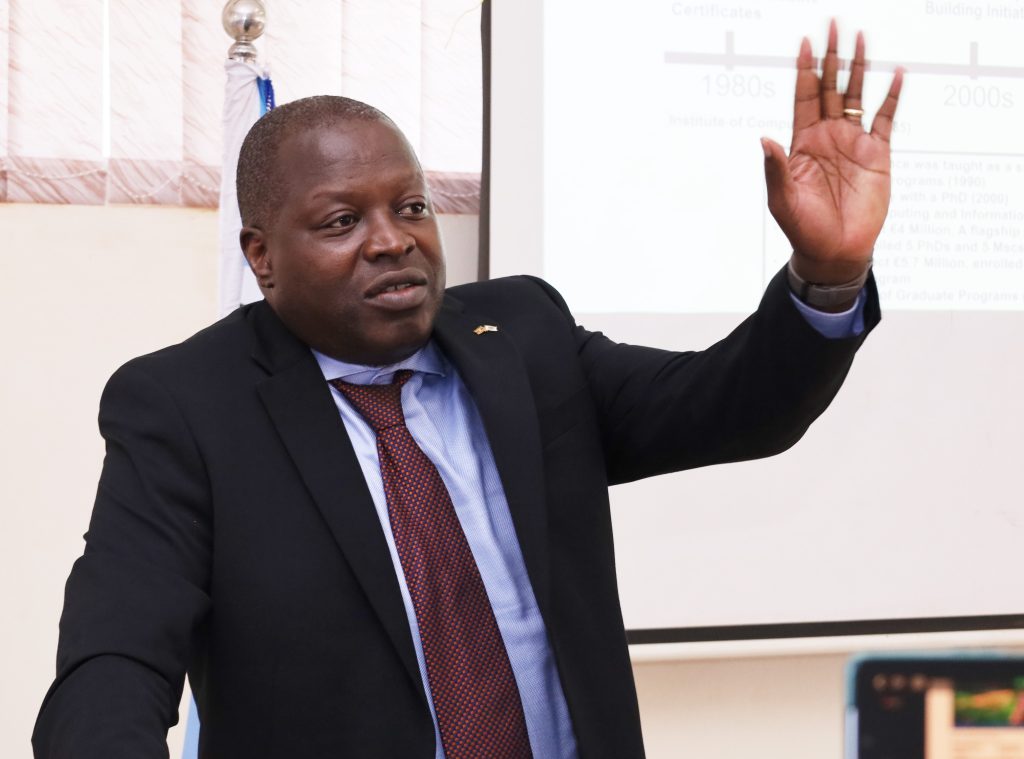
The Principal CoCIS Prof. Tonny Oyana said the college can do better on the grounds that has a good research infrastructure with a grants officer, graduate coordinators at the college level and a school supporting graduate activities.
“We also have also set aside the seed money where students apply and we have supported a number over the last four years and in March recently, 10 PhD students we are supported with the Mak-RIF as another Avenue”, Prof. Oyana said.
Presenting the college strategy to improve graduate training, the Principal attributed the low graduate completion rates to a lack of funding for self-funded students as they have to meet both academic fees and other social-economic obligations. Oyana stressed it was critical for the university and stakeholders in the education chain to support graduate students through tuition.
Highlighting the growth strategy from the 1980’s with only two PhDs, Oyana said the college currently has over 50 staff with PhDs with various programs attesting to the fact that research facilitation is good.
Prof. Oyana expressed pride that the college focus has been on research and innovation that has churned out graduates who have established startups concentrated around Kampala suburbs doing a good job in terms of helping grow the economy.

“We do a lot of data analytics, we support businesses, knowledge, insights…. and we have been successful to win grants because we work as a team with other colleges like the College of Health Sciences.
We have some flagship programs like Library, Computer sciences, Information science and software engineering. The top 10% of our students enrolled in these programs get AAA’s, and we get the cream of the nation in the college and that is why we have charming Innovations that have come up in the college”, Prof. Oyana stated.
The Principal also highlighted areas of research priority including Artificial Intelligence and Data Science, Software systems, network systems, cyber security, informatics technology, Library science, records and information-seeking behaviour in agriculture and finance with the AirQo environmental sensing as a big activity.
In research, Prof. Oyana reported that the college has supported faculty and student research activities to a tune of Shs. 250 million. In contrast, in a pace of four years, the number of publications increased to 78.
With a student population of 4000, Prof. Oyana said in future, the teaching and research have to be more personalized via video with the introduction of Robotics technology in the college to be blended with traditional techniques of classroom learning.
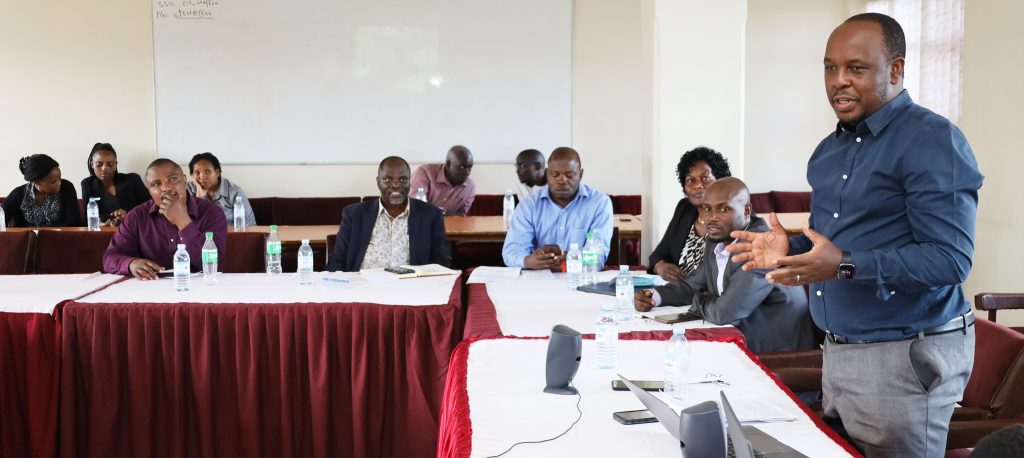
With support from the government, university and donors, the Principal pledged to build a world-class college with automation by leveraging the expertise and research in air quality and artificial intelligence among others.
He said the college has been blessed with foreign partners who have provided generously in terms of money. He said, Google, so far in the college’s history, has been the largest donor and has so far earned the college about four million U.S. dollars.
You may like
-


Makerere Graduation Underscores Investment in Africa’s Public Health Capacity
-


200 UVTAB students graduate: CEES emphasizes Skills, Integrity and Community Impact
-


Makerere’s 76th Graduation Ceremony: CHS showcases research strength with 26 PhD Graduates
-


Mak 76th Graduation Ceremony: CoNAS Presents 16 PhDs & Best Performing Male Student in the Sciences
-
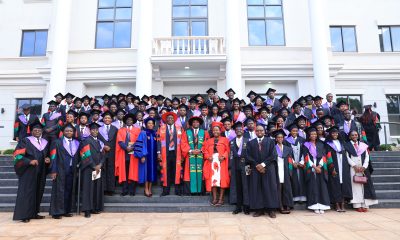

Mak 76th Graduation kicks off: SoL hailed as a Centre of academic Excellence
-


CAES Presents Overall Best Performing Student in the Sciences & a Record 28 PhDs at the 76th Graduation Ceremony
Computing & IS
Makerere Launches Scholarly Guide, Calls for Increased Research, Publication and Innovation in Africa
Published
3 weeks agoon
February 12, 2026By
Jane Anyango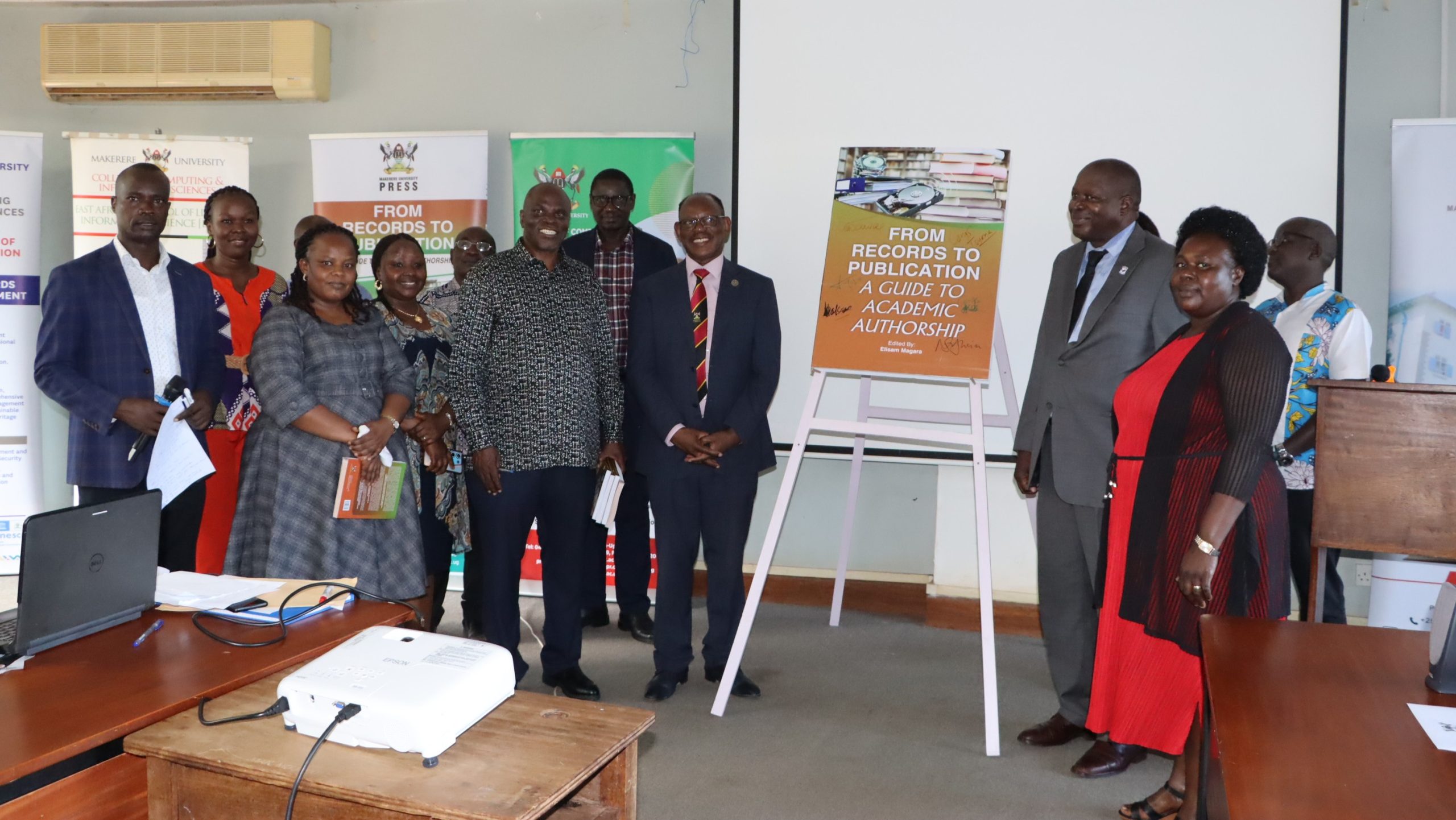
VC Emphasizes Research as Key to Africa’s Global Integration
Makerere University Vice Chancellor, Prof. Barnabas Nawangwe, has urged universities across Africa to invest in research, publication, and innovation as a pathway to greater participation in the global knowledge economy.
Speaking at the launch of From Records to Publication: A Guide to Academic Authorship, edited by Prof. Elisam Magara of the East African School of Library and Information Sciences, Prof. Nawangwe highlighted Africa’s low contribution to global scholarship. “Although Africa accounts for 15 percent of the world’s population, it produces only 3 percent of global research publications,” he said.
“There are historical reasons for this,” the Vice Chancellor continued, referencing centuries of slavery and colonialism. “You cannot brush away 600 years of subjugation. And we Africans have not even written enough about that. If we want to move Africa back into the global community, we must invest in research, publication, and innovation.”
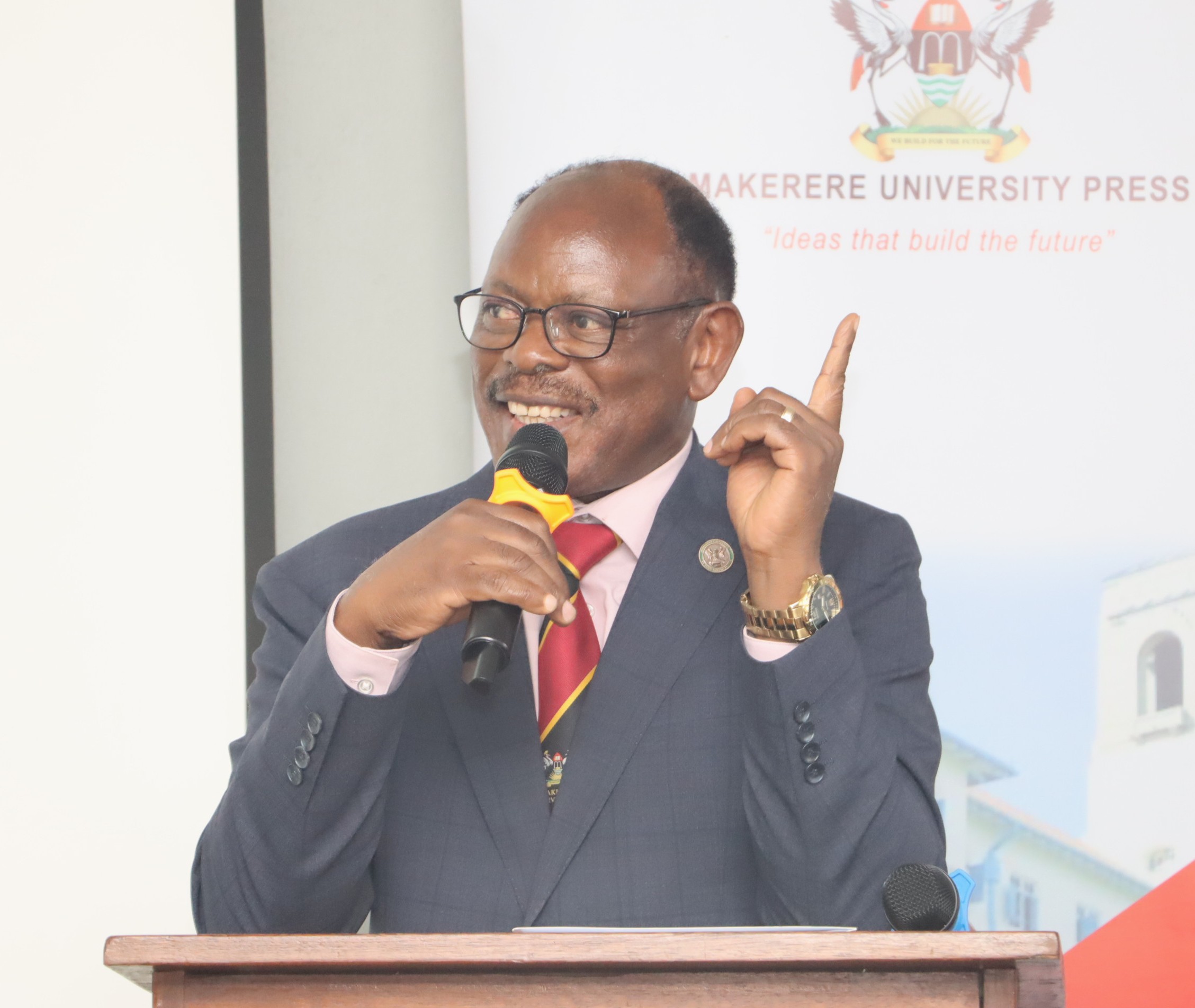
He cited China as an example, noting how the country’s investment in research and education has translated into economic and global influence. “When we say China is the factor of the world, it is not that people just wake up and begin making things. They invest in education, in publication, in research. If we want to transform Africa, we must do the same.”
Prof. Nawangwe highlighted Makerere’s progress, revealing that annual peer-reviewed publications have grown from about 500 a decade ago, to 700, and now exceed 2,000. He acknowledged that the university still trails South African institutions, partly because they operate numerous local journals that absorb significant volumes of research. “We are not fully utilising the brand of Makerere University Press,” he said, pledging support to strengthen the press and scale up journal production.
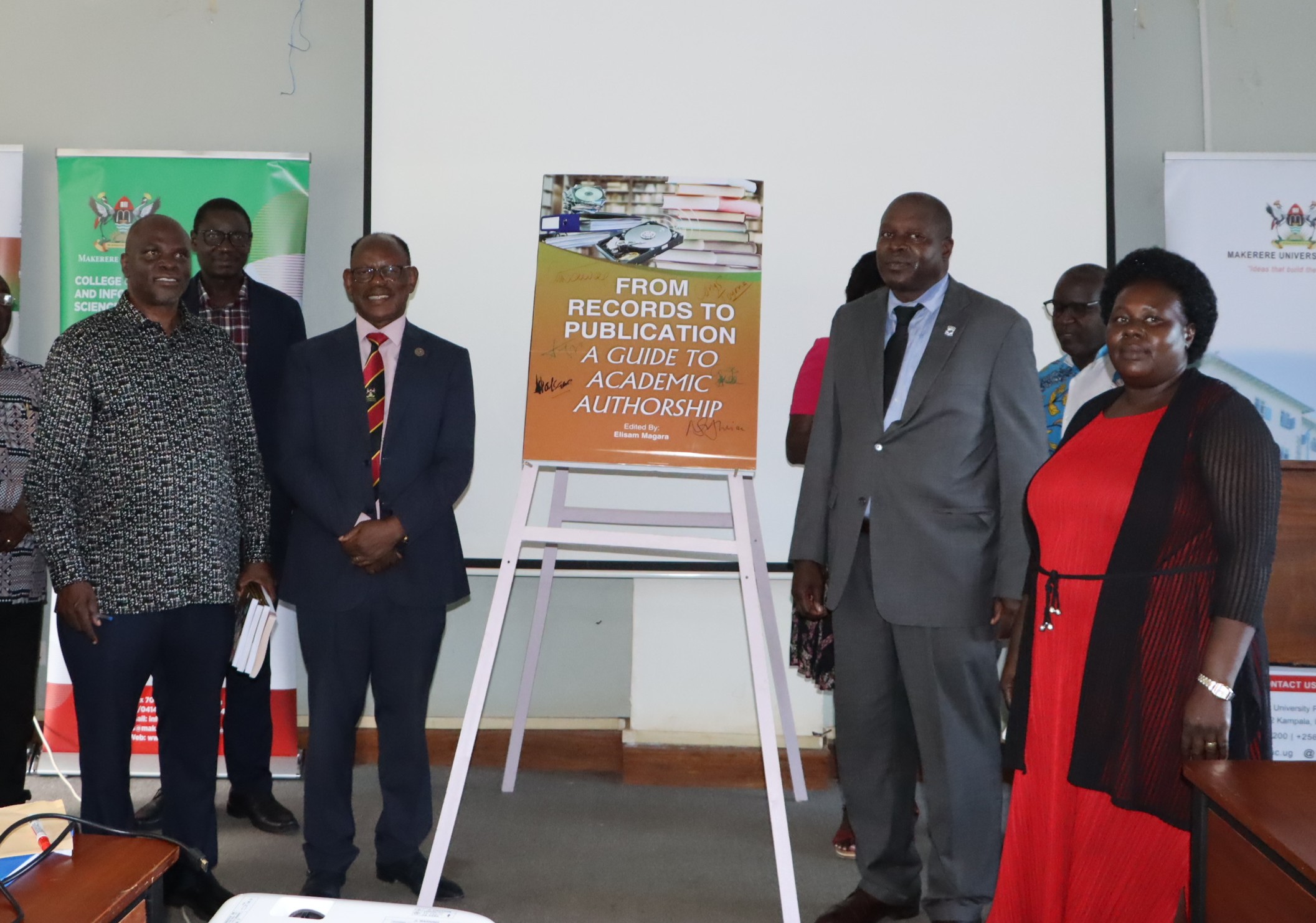
He also reaffirmed the university’s strategy to reduce excessive undergraduate enrolment and expand graduate training to boost research output. “Let us create time for professors to do research and supervise more graduate students,” he said.
Commending Professor Magara and his team for producing the authorship guide, Prof. Nawangwe described the book as an essential handbook for Master’s and PhD students, early-career researchers, and universities across the region striving to become research-led. “This is at the heart of the university. If we invest in research and publication, we secure our future,” he said.
Book Recommended as Mandatory Guide by College Principal
Makerere University’s Principal of the College of Computing and Information Sciences, Prof. Tonny Oyana, called for the newly launched volume to be adopted as a mandatory guide for graduate students and newly appointed lecturers. “This is not a bad book for our first-year PhD students to start with,” he said. “Even those who are hired as junior lecturers still need mentorship. If I were the Vice Chancellor, I would put this book as required reading for every new hire.”
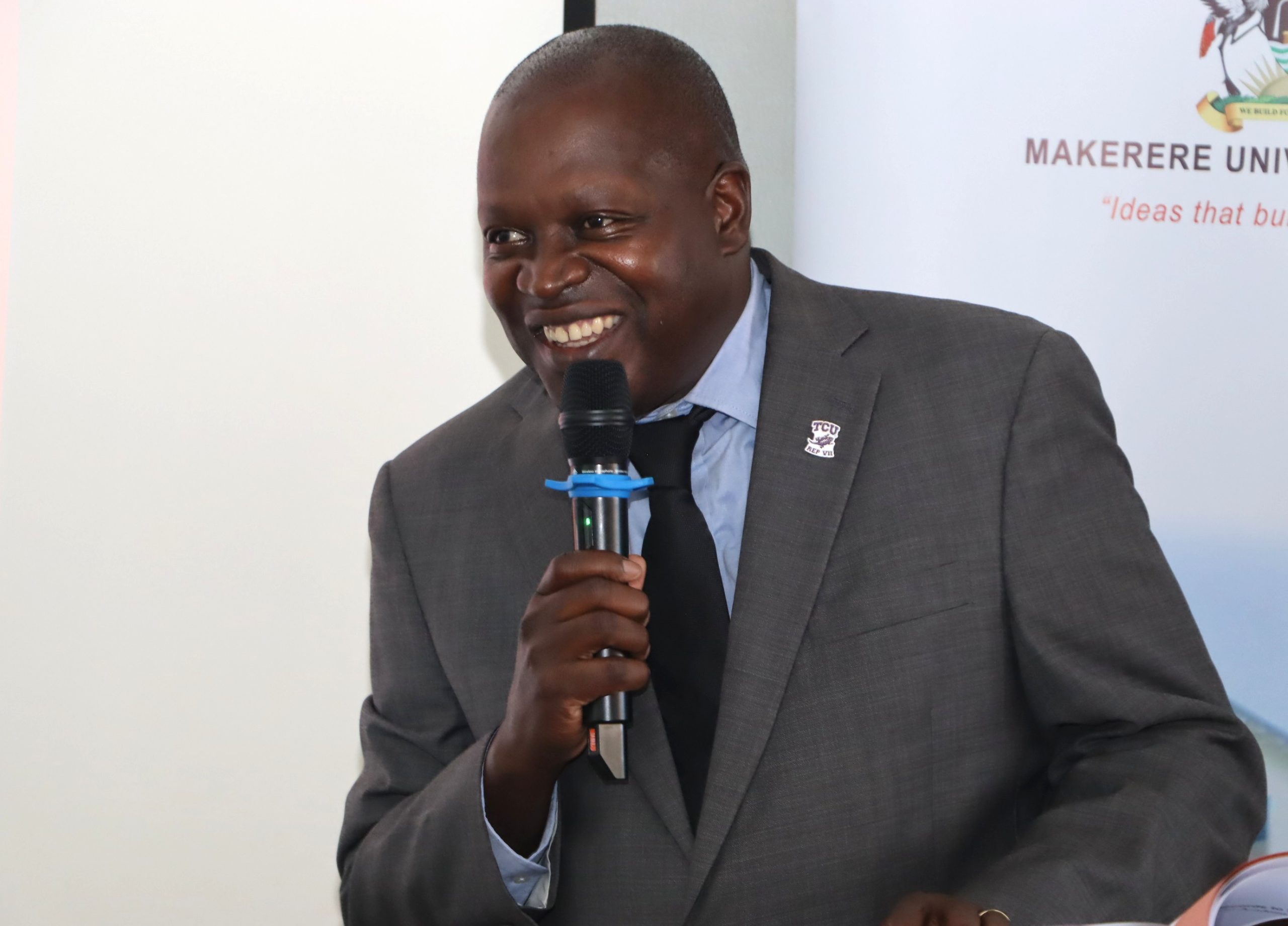
Prof. Oyana reflected on his personal contribution to the book, revealing that administrative responsibilities nearly forced him to withdraw. “Because of the work that I do, I was about to give up,” he admitted. “But Professor Magara was persistent. He came back to me and gave me more time.”
He credited a PhD student, Caroline Ilako, for assisting with library research and literature reviews, saying, “She did a wonderful job. We went back and forth through revisions, but finally we produced the work.”
On the quality of the book, Prof. Oyana said, “When you pick up a book, look at how it is laid out. The quick judgment tells you about the quality. This is well put together. We are beginning to show quality comparable to Western presses.”
He also challenged traditional notions of “publish or perish,” noting, “As scholarship evolves, those who evaluate scholarship must also adjust. Impact, innovation, and tangible products are increasingly valued alongside journal articles.”
Editor Highlights Research-Based Approach
Prof. Elisam Magara, the book’s editor, explained that the guide is designed to support scholars from the moment they conceive a research idea to the point their work is published and read. “I looked at the books we were using and asked myself: which kind of book can truly guide students? We needed a clear guide from the time a scholar thinks of writing up to the time the book is read,” he said.
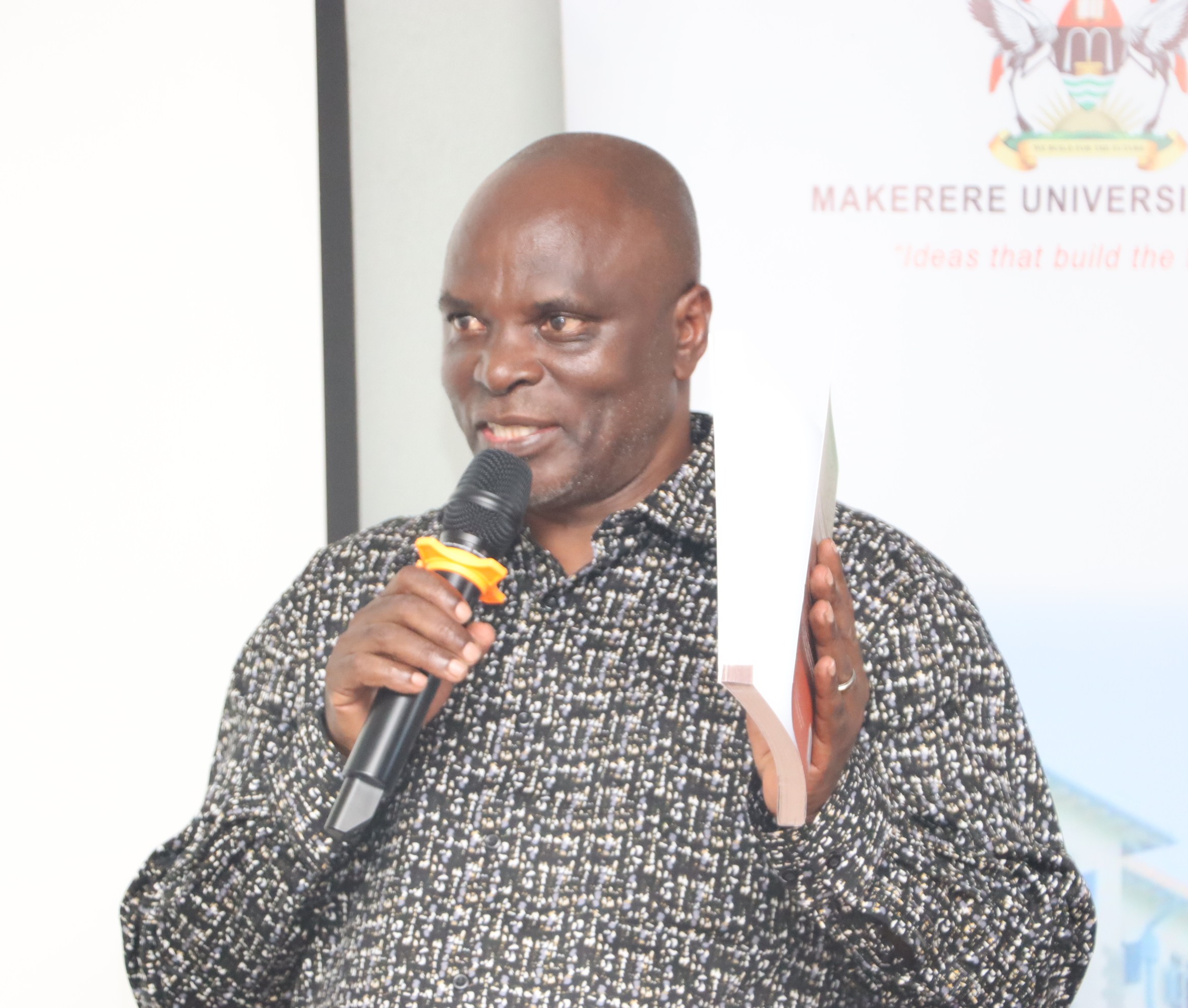
He detailed the rigorous editorial process that began in 2022, including international calls for contributions, peer review of abstracts, writeshops for feedback, and multiple rounds of chapter reviews. “Don’t write and keep,” he advised. “Your book must have impact. It must reach the public and be used.”
Prof. Magara also acknowledged the sabbatical granted by the Vice-Chancellor, which enabled him to balance teaching and editorial responsibilities. “This book is meant not just for Makerere but for scholars across the region and beyond,” he said.
Mak Press Outlines Rigorous Publishing Process
Dr. Isaac Tibasima, representing the Managing Director of Makerere University Press, explained the publication pathway. “Once you bring your manuscript to the press, we take it through evaluation, external peer review, revisions, copy-editing, typesetting, and pre-press review before printing,” he said.
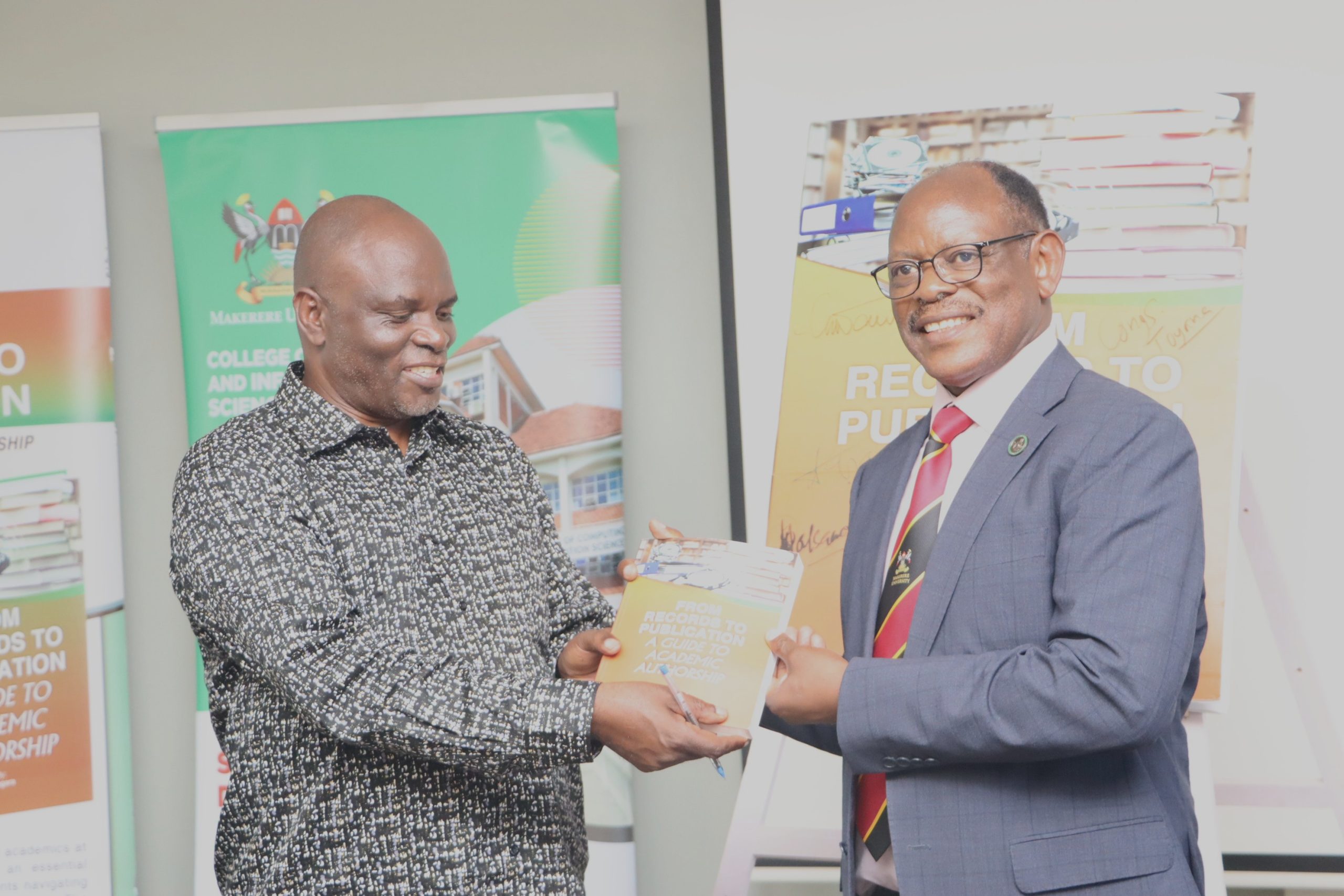
He also highlighted the press’s efforts to strengthen college-based journals. “We will not run the journals, but they will be published under the imprint of Makerere University. If we produce consistent issues, we can then move toward global indexing,” Dr. Tibasima said.
All new journals and articles now carry Digital Object Identifiers (DOIs) to enhance discoverability, while past publications are being retroactively assigned DOIs. “We are not there yet, but we are moving there, and we are intentional about getting there,” he added.
School Leaders Celebrate Scholarship and Mentorship
In welcome remarks, Dr. Sarah Kaddu, Dean of the School, said, “This event is a celebration of scholarship, intellectual discipline, and the journey of knowledge creation. This book speaks directly to one of the most critical challenges facing scholars—transforming research records into publishable work.”
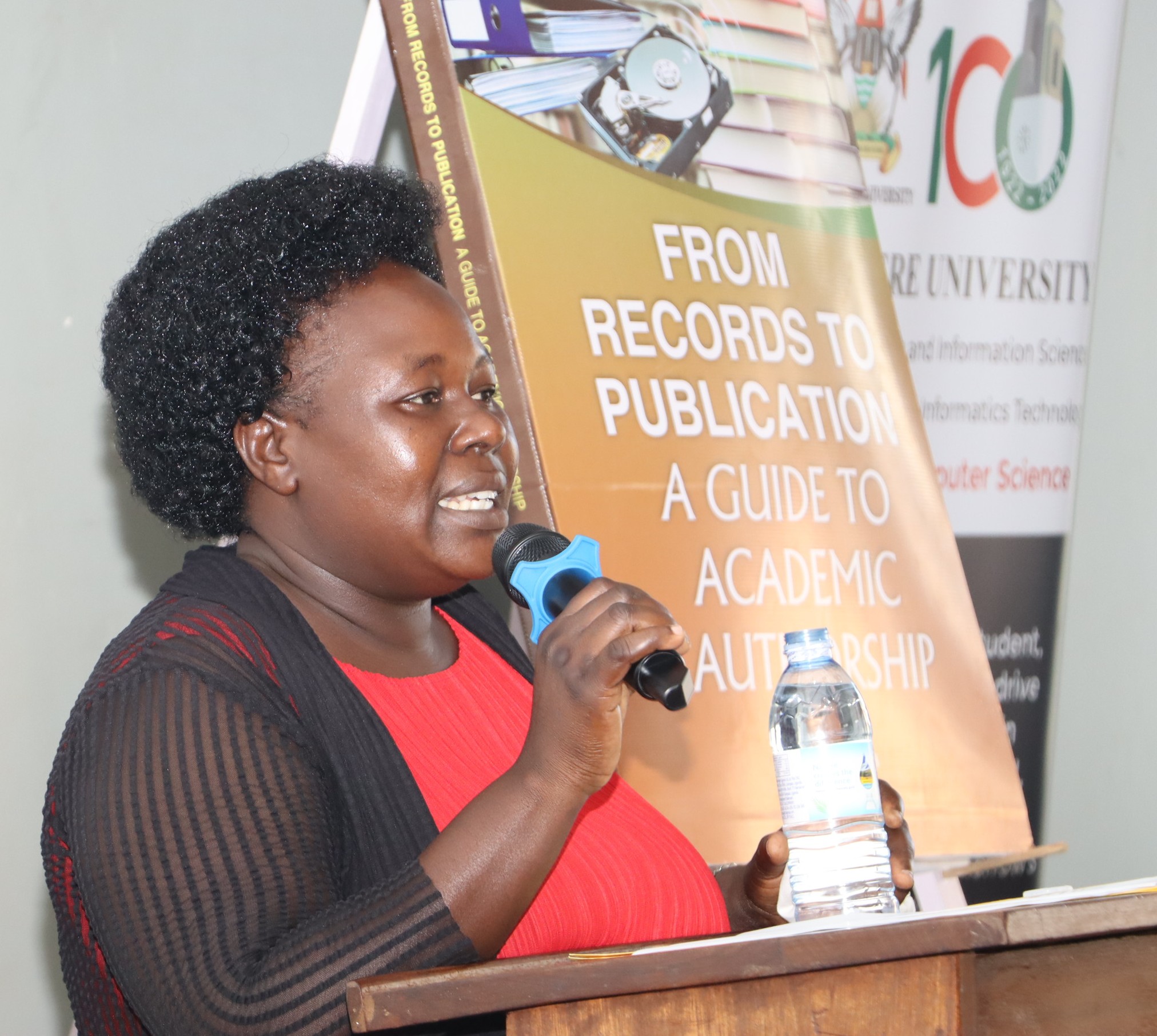
Dr. Sylvia Namujuzi, Head of the Department of Records and Archives Management, added, “This book is timely. It responds to real challenges faced by early-career researchers, postgraduate students, and even seasoned academics—questions of structure, authorship ethics, citation, collaboration, and navigating the publication ecosystem.”
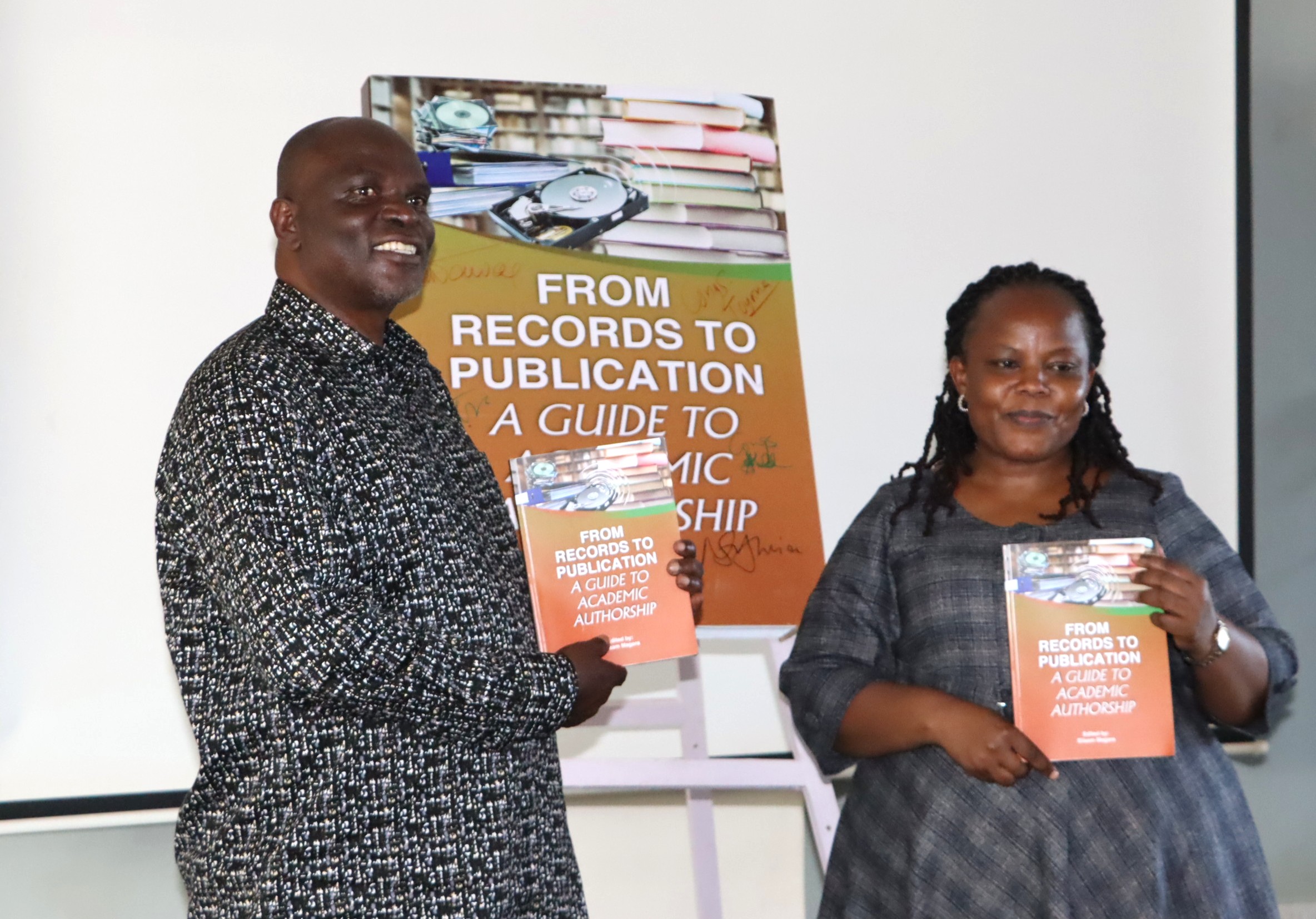
She concluded: “Well-managed records are not endpoints; they are the beginning of inquiry, reflection, and publication. This guide demonstrates that pathway.”
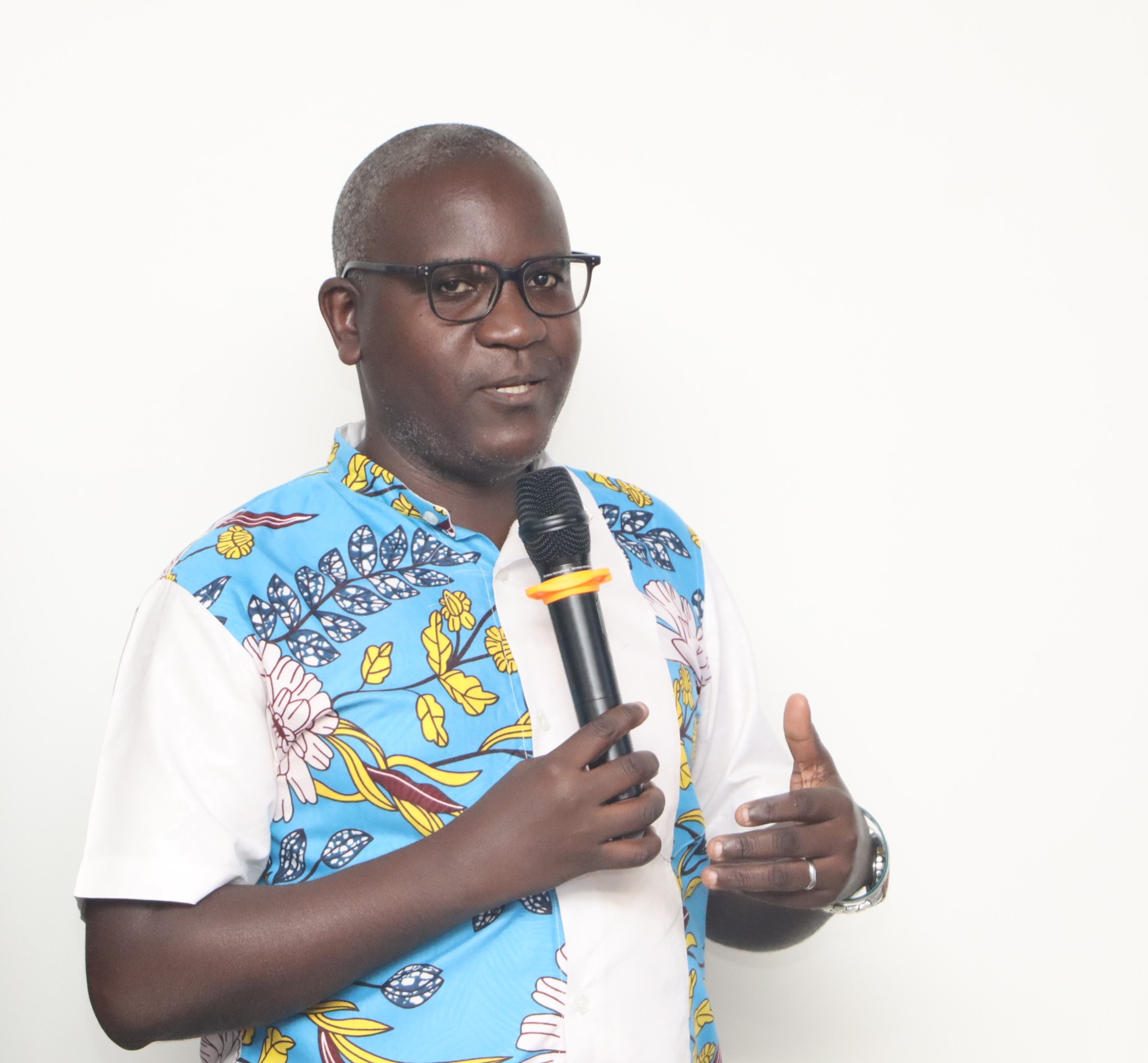
Book Outline
- Introduction: Publication Journey. (Prof. Elisam Magara)
PART I: Foundations of Academic Authorship.
- Conceptual Foundations of Academic Authorship
Elisam Magara and Joseph Kiplangat.
- Archives as a Source of Information for Academic Writing
David Luyombya, Sylivia Namujuzi and Francis Ekwaro
- The place of Oral History in Contemporary Writing
Elisam Magara, James Nkanshah-Obrempong and Nthan Nzyoka Joshua
- Managing Ethical Dilemmas in Academic Writing
Maria Tsvere, Tsitsi Kanonge and Joselin Chigwada
- The Role of Copyright and Neighbouring Rights in Protecting Works of Authors and Publishers in Uganda
Ronald Kakungulu Mayambala
PART II: Managing the Publication Process
- A Manuscript: From Inception to Publication
Sarah Mirembe Kyankya
- Managing Co-Authorship in Academic Writing
Gankhanani Moffat Moyo
- Managing Illustrations and Visual Artworks in Academic Writing
Bob Magara Rutatugirwa
- Tapping into Open Access Platforms for Gainful Authorship
George Muganga
- Managing the Costs in Academic Authorship
Aloysius Rukundo
- The Important Translation in Publication
Monica Mweseli
- Citations and Referencing in Academic Writing
Clement Lutaaya Nabutto, Namujuzi Sylivia, and Daviv Luyombya, Makerere University
- Referencing Management Software In Academic Writing
Odeke Moses Osamai and Constant Okello-Obura
- Compliance with International Bibliographic Control Standards in Academic Authorship
Elisam Magara and Dniel Osinde
PART III: Secondary Services in Academic Writing
- Journal Impact Factor and its Role when Submitting a Publication Article
Tonny J. Oyana and Caroline Ilako
- Managing Mentorship Programmes for Scholarly Writing
Diyoshak Rhoda Danladi and Elisam Magara
Report by
Jane Anyango, Principal Communication Officer CoCIS
Ritah Atukwatse, Journalism and Communication Student (2nd Year)
Fred Kanwagi, Journalism and Communication Student (3rd Year)
Computing & IS
CoCIS CIPSD Short Courses Jan-Mar 2026
Published
1 month agoon
January 19, 2026By
Mak Editor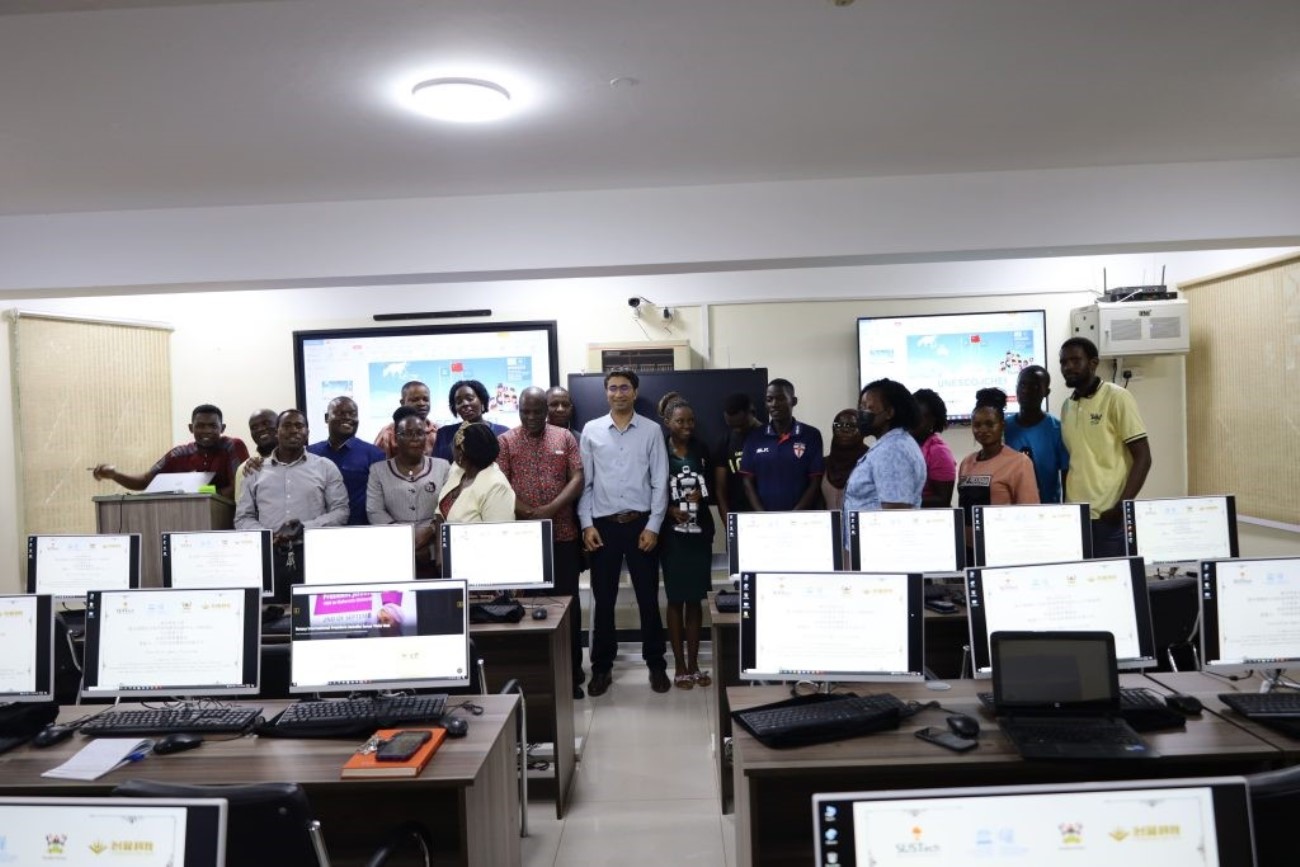
Makerere University College of Computing and Information Sciences (CoCIS) is the main ICT Training, Research and Consultancy Centre in Makerere University. The College has six Academic departments comprising of the Department of Computer Science, Department of Networks, Department of Information Technology, Department of Information Systems, Department of Library and Information Sciences, and the Department of Records and Archives management.
In addition to the mainstream degree programmes, CoCIS has a specialized Center for Innovations and Professional Skills Development (CIPSD) which delivers state-of-art training in ICT e.g. the Cisco Networking Academy for Cisco related courses, the Microsoft IT Academy Program for Microsoft related courses, International Computer Driving License course, Oracle Certified Training center for Oracle, Linux and Unix Training center. CIPSD also offers Machine Learning, Big Data Analytics, Data Science, Artificial Intelligence (AI) and Ethical Hacking as online courses. The College is an authorized Testing center, operating under PearsonVUE and Kryterion. Listed in the table (see download below) are the courses currently offered at the Center with their next start dates, duration, and cost.
- All courses are at affordable fees catering for Students, Vacists, Professionals and
- Anyone who wants to start a career in ICT or polish his/her ICT skills.
Contact Information
E-mail: psd.cis@mak.ac.ug
Tel: +256 782 512 897 +256 752 779964
URL: https://cocis.mak.ac.ug/cipsd/
Computing & IS
Makerere University and SoonPay Sign Landmark MoU to Champion Blockchain Innovation and Financial Inclusion Across Africa
Published
3 months agoon
December 9, 2025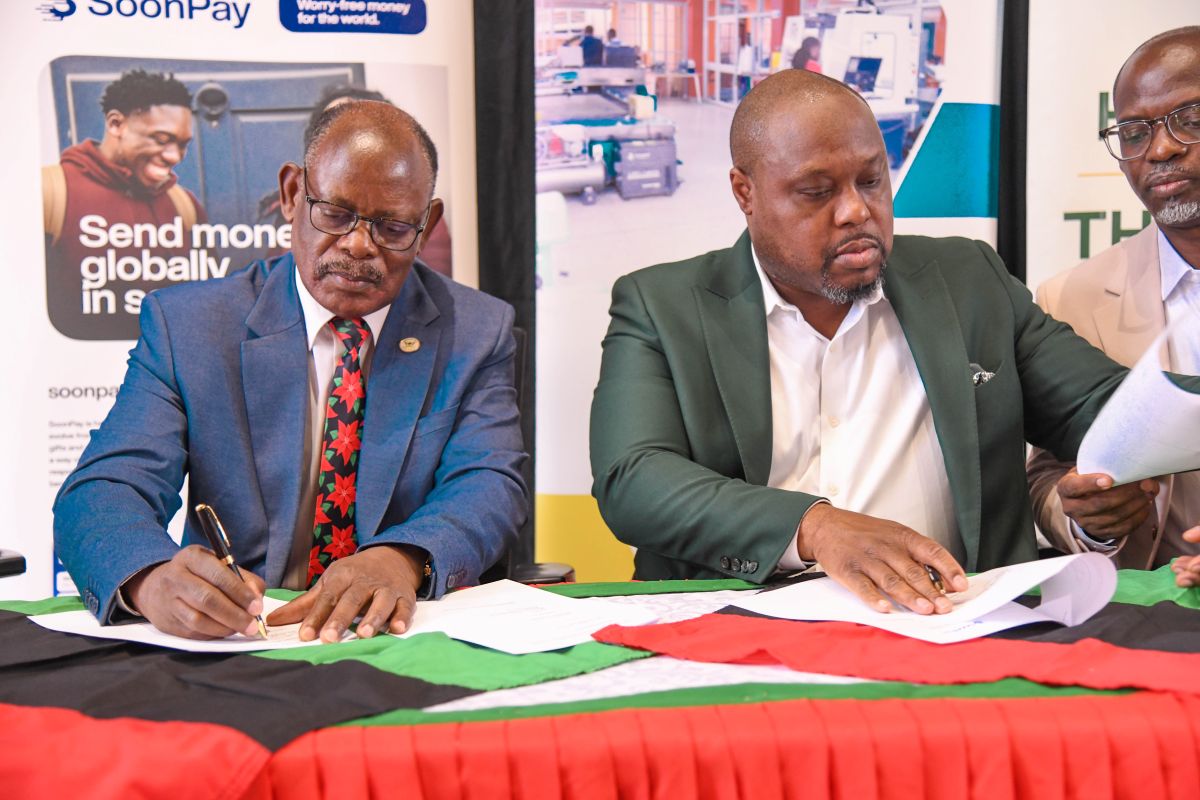
On Saturday 6th December 2025, Makerere University entered into a ground-breaking partnership with the U.S.-based fintech company SoonPay, marking a major breakthrough in Uganda’s push to integrate emerging technologies into research, innovations, higher education and national development.
The Memorandum of Understanding was signed by the Vice Chancellor of Makerere University, Prof. Barnabas Nawangwe and Mr. Frantz Morency, Chief Executive Officer of SoonPay L.L.C, during the Makerere University Financial Innovation Day, a high-energy event that brought together over 800 students, faculty, industry partners, and technology leaders.
The MoU institutionalizes the collaboration of Makerere University through the Makerere University Technology and Innovation Centre and SoonPay LLC. The signing ceremony was witnessed by Dr. Cathy Ikiror Mbidde-Manager of Makerere University Technology and Innovation Centre and Ms. Vuyani Jones-Blockchain Infrastructure Manager.
Organized by the Makerere University Technology and Innovation Centre (MUTIC) in partnership with SoonPay, the event ran under the theme “Innovation and Financial Inclusion for a Secure Future.” It featured keynote speeches, panel discussions, live demonstrations, and the signing of a Memorandum of Understanding (MoU) that will usher in a new era of blockchain training, research, and innovation at Uganda’s premier university.
The event was supported by several partners, including the National Social Security Fund (NSSF), the Uganda Blockchain Association, the National Planning Authority (NPA), Prudential Uganda, and other technology and financial sector stakeholders.
A Strategic Partnership to Transform Africa’s Digital Landscape
The newly signed MoU between Makerere University and SoonPay is expected to unlock a broad set of opportunities for students and academic staff. These include blockchain education and certification, joint research projects, internships and apprenticeships, the development of new financial inclusion tools, and the integration of emerging technologies into existing academic programs.
SoonPay’s entry into Uganda is part of a larger vision to expand blockchain-driven solutions across Africa—a continent its executives say has historically been excluded from global technological revolutions.

Impressed by the overwhelming numbers of students who filled the Yusuf Lule Central Teaching Facility Auditorium to the brim, the Vice Chancellor, said: “Dear students, by choosing to stay on campus, on a Saturday, and after completing your examinations, you have demonstrated your willingness to learn and embrace the blockchain technology as well as emerging technologies in general.”
Stating that blockchain technology is the future for Africa, the Vice Chancellor challenged the students to take charge of Africa’s digital transformation.
“You are the people to emancipate Africa from marginalization,” he declared. “What will liberate our continent is not politics—we have done too much of that. It is education, research, innovation, and technology.”
Prof. Nawangwe delivered a sweeping historical reflection, tracing Africa’s technological setbacks to the destruction of its civilization over several centuries.
“For 400 years, Africans were taken away as slaves. For another 200 years before that, our lands, knowledge systems, and technologies were disrupted,” he said. “This represents around 600 years of destruction and marginalization of African civilization.”
He urged students not to miss the opportunity that modern technologies such as blockchain and artificial intelligence present.
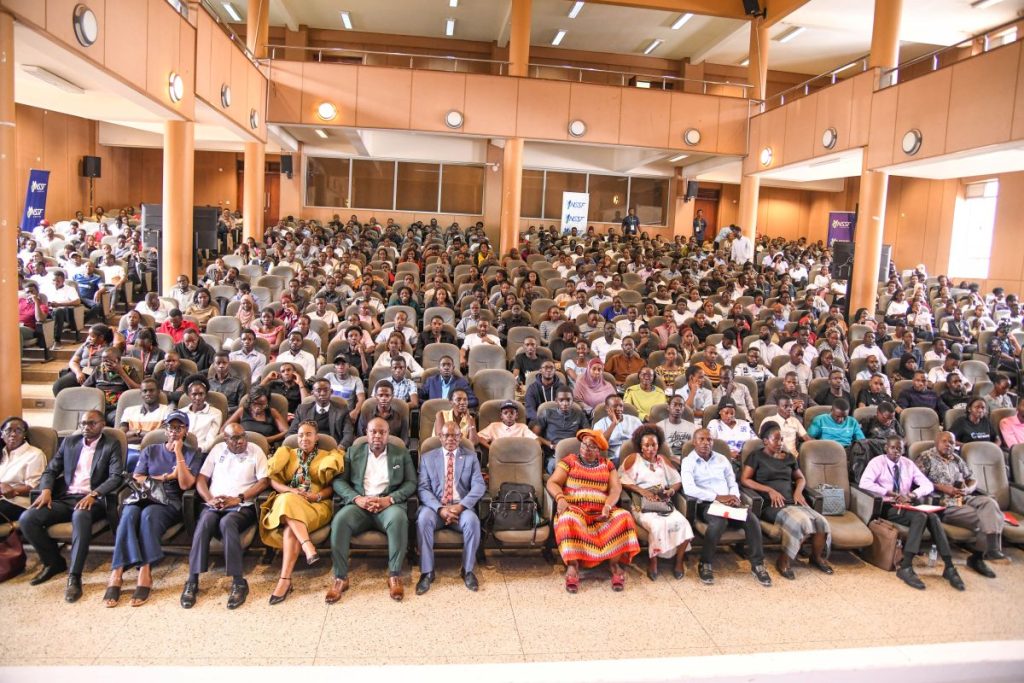
“We are lucky to be living in an era where Africa is free,” the Vice Chancellor said. “My hope is that we do not wait another 600 years to take advantage of this freedom. The most important resource we have is not minerals; it is human resources—you, the youth.”
Prof. Nawangwe reminded students that Makerere’s reputation as the “intellectual capital of Africa” places immense responsibility on their shoulders.
“You are among the very few Ugandans privileged to study at Makerere University. University graduates are not supposed to wait for jobs—you are the ones expected to create them,” he said.
Why Blockchain? Transparency, efficiency, and global competitiveness
The Vice Chancellor highlighted the transformative potential of blockchain technology, especially in improving financial systems—a sector he described as the backbone of any modern economy.
“Without efficient financial systems, nothing else works,” he said. “Blockchain offers transparency, reduces fraud, and minimizes corruption. If applied properly, it could transform how we manage finances, education, and even our natural resources, including the oil that Uganda is about to exploit.”
He added that Makerere’s students are already demonstrating global competitiveness in innovation, winning international competitions and creating products across multiple disciplines.
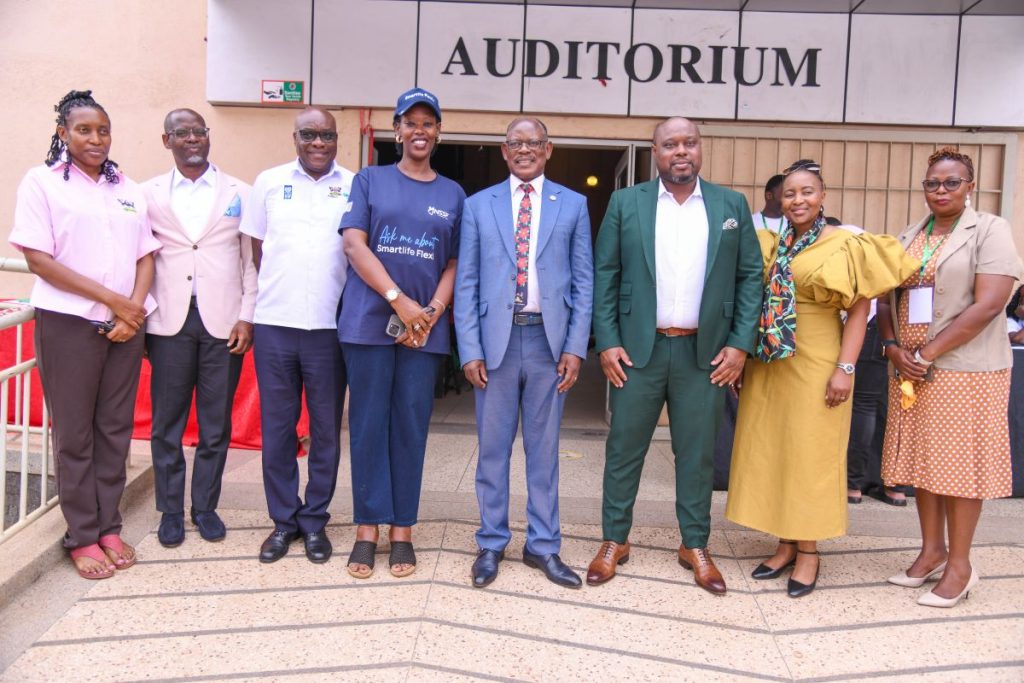
“The brains are here,” he said. “What we need is exposure to opportunities and technologies that will help you turn your ideas into impactful solutions.”
In a passionate keynote address, SoonPay CEO, Mr. Frantz Morency underscored why his company chose Uganda as its launchpad for blockchain adoption in Africa.
“As the Professor said, we have been excluded for more than 400 years,” he stated. “Even though we’re an American company, we know our roots. Look around the SoonPay team—you will see yourselves. We chose Uganda intentionally.”
Mr. Morency pointed to Africa’s dismal participation in the global blockchain economy. “In the U.S., blockchain generates $2.6 billion—61.7 percent of the world’s share. The rest of the world generates $1.6 billion. And Africa, just $14 million, or 0.33 percent,” he said. “That is unacceptable.”
He attributed the gap not to a lack of interest among young Africans, but to a lack of opportunity. “You want to learn—what you lacked was opportunity,” he said. “With the support of Professor Nawangwe, Dr. Cathy Ikiror Mbidde, and Dr. Margaret Nagwovuma, SoonPay wants to bridge that gap in education, technology, and economic opportunity.”
Mr. Morency also shared his personal journey, connecting his Haitian background to the aspirations of African youth.
“Many of you may see me as ‘the guy in the green suit,’ but I come from a small island—Haiti,” he said. “My mother never finished first grade; my father never finished second grade. What they gave me was integrity, work ethic, and the determination to seize opportunities when they came.”
He urged students not to seek opportunities abroad out of desperation, but to build meaningful careers in Africa. “Africa does not need to lose its talent. Why can’t you build here? Why can’t businesses, innovation, and prosperity thrive here?” he said. “Educate yourselves. Build. Create. Grow.”
A milestone for Makerere and Africa
Dr. Cathy Ikiror Mbidde, Head of the Makerere University Technology and Innovation Centre (MUTIC), described the event as a “major milestone” in the institution’s evolution.
“We are here to witness one of the key emerging technologies and to reflect on how universities can embrace such milestones,” she said. “Everyone has a role to play in transforming our lives through research, ideas, and projects.”
She thanked SoonPay for choosing Makerere University, noting that students had been “instrumental” in pushing for blockchain education.
“You have been constantly asking questions, pushing us, and showing deep curiosity about blockchain. Today, we finally have answers,” she told the students.
Beyond the speeches, the event showcased SoonPay’s blockchain infrastructure, student-led innovations, and a roadmap for integrating digital finance tools into university programs. Partners such as NSSF emphasized the importance of preparing young people for a digital future.
With the MoU now in force, Makerere University is positioning itself as a regional hub for blockchain education, research, and innovation. The partnership with SoonPay aims not only to train students but to shape Uganda’s—and Africa’s—next generation of tech leaders.
Trending
-

 Humanities & Social Sciences1 week ago
Humanities & Social Sciences1 week agoMeet Najjuka Whitney, The Girl Who Missed Law and Found Her Voice
-

 General1 week ago
General1 week ago76th Graduation Highlights
-

 Agriculture & Environment2 weeks ago
Agriculture & Environment2 weeks agoUganda Martyrs Namugongo Students Turn Organic Waste into Soap in an Innovative School Project on Sustainable Waste Management
-

 Health2 weeks ago
Health2 weeks agoMakerere University School of Public Health Graduates First Cohort of Cost-Effectiveness Analysis Short Course
-

 Agriculture & Environment1 week ago
Agriculture & Environment1 week agoCAES Presents Overall Best Performing Student in the Sciences & a Record 28 PhDs at the 76th Graduation Ceremony
